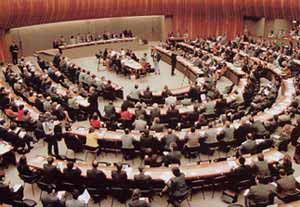 |
Discussions in the international organizations, Eg. United Nations |
  |
|
In the various organizations of the United Nations the comfort women issue was put on the agenda from early 1990s. The first important document was an attachment to a report dated January 4, 1996, submitted by the Special Rapporteur Radhika Coomaraswamy, who was appointed by the United Nations Commission on Human Rights (UNCHR). It is entitled "Report on the mission to the Democratic People's Republic of Korea, the Republic of Korea and Japan on the issue of the military sexual slavery in wartime.(Full text see ). ).
|
This report regards the comfort women issue as “military sexual slavery,” and asserts that the Japanese Government should accept legal responsibility for the violation of international law. The Special Rapporteur wrote that the Japanese Government had accepted moral responsibility for the existence of the comfort women, and that she “considers this a welcome beginning.” She also wrote that she saw the Asian Women’s Fund “as an expression of the Japanese Government’s moral concern for the fate of ‘comfort women.’” However, she stated that this did not exempt the Government from “the legal claims of ‘comfort women’ under public international law.” In addition, she called on the Japanese Government to accept legal responsibility, pay compensation, make a full disclosure of documents and materials in its possession, issue a public apology, raise awareness by amending educational curricula to reflect historic realities, and punish perpetrators as far as possible.
On June 22, 1998, two years after the Coomaraswamy report, the United Nations Special Rapporteur on Violence against Women in Wartime Gay McDougal submitted a report to the UNCHR Sub-Commission on the Prevention of Discrimination and Protection of Minorities. The report was entitled "Contemporary Forms of Slavery." In this report, the nature of the comfort station systen was unilaterally described as "sexual slavery at a rape center." (Full text see .) .)
On the other hand, as early as in 1997, the Sub-Commission (now the Sub-Commission on the Promotion and Protection of Human Rights) recognized, taking note of the information provided by the Government of Japan, that “the positive steps” were made so far towards the solution of this issue (Full text see ). Many of the UNCHR members and members of the Sub-Commission expressed a certain degree of appreciation with respect to the handling of the problem by the Japanese government and especially the atonement project and other activities implemented by the Fund. They said that they were not sufficient, but that they were at least a step forward toward solving the problem. The UN High Commissioner for Human Rights Mary Robinson also evaluated the activities of the Fund positively. ). Many of the UNCHR members and members of the Sub-Commission expressed a certain degree of appreciation with respect to the handling of the problem by the Japanese government and especially the atonement project and other activities implemented by the Fund. They said that they were not sufficient, but that they were at least a step forward toward solving the problem. The UN High Commissioner for Human Rights Mary Robinson also evaluated the activities of the Fund positively.
 The United Nations The United Nations
 The Commission on Human Rights The Commission on Human Rights
 The Sub-Commission on the Promotion and Protection of Human Rights The Sub-Commission on the Promotion and Protection of Human Rights
 Other Other
 The ILO and other organizations The ILO and other organizations
 ILO ILO
 Other organizations Other organizations
|
|
  |
|
|

